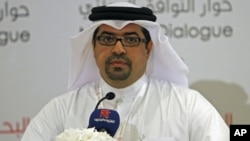Bahrain’s Sunni rulers are sitting down this week with opposition leaders for the first time since anti-government protests brought the country to a standstill earlier this year. The talks are dealing with political, economic and social issues that have been plaguing the Persian Gulf kingdom.
The main opposition al-Wefaq party has confirmed that it is taking part in the national dialogue, after some reluctance to join.
Eighteen members of the bloc quit parliament in February following a bloody crackdown on pro-democracy demonstrators. The group has been one of the most vocal critics of the government’s handling of the recent unrest.
Optimism on agreement
National dialogue spokesman, Eisa Abdul Rahman, said al-Wefaq’s participation is a strong sign that a lasting agreement can be worked out.
"We are optimistic that there will be a middle ground and I think by considering the consensus mechanism, that is a signal by itself that we are aiming to move forward as one nation between all the various political parties and all the various interests," said Rahman.
Protests organized by Bahrain’s majority Shi’ite Muslims began in mid-February, following uprisings in Tunisia and Egypt. The Shi’ites say they are treated like second-class citizens and are not given the same benefits as the ruling Sunni minority.
Their main demands have been for a new constitution, a more representative government, the release of political prisoners, an end to discrimination and an end to the naturalization of foreign citizens.
National dialogue meeting
It is believed these concerns will be highlighted during the national dialogue meetings, which are scheduled to take place three times a week. The talks are expected to last about a month, but Rahman said no end date has been set.
"We’re not going to have a predefined time frame for the dialogue. We don’t want to pressurize the participants and we don’t want time to work against us," said Rahman. "We want them to feel comfortable in discussing all the issues and reach consensus at their own pace."
The international community has widely welcomed Bahrain’s reconciliation talks. On Tuesday, United Nations Secretary-General Ban Ki-Moon announced his support and urged Bahraini authorities to “take further steps” to observe international human rights obligations.
But doubts have also been voiced.
Some skepticism expressed
Jalal Fairooz, one of the 18 al-Wefaq members who quit parliament in February, said the talks are unlikely to result in the significant change needed to satisfy the opposition.
"The solution is in the hands of the king and the royal family; it’s not in the hands of this dialogue," said Fairooz. "This is only a chitchat room, because in the end, all of the points raised will be put forward to the king. The king will decide what he can approve and not approve, and that’s the greatest weakness of this chatting dialogue."
Bahraini authorities say 24 people were killed during opposition protests in February and March. International rights groups say the number is closer to 30.
On Wednesday, New York-based Human Rights Watch accused Bahrain of carrying out a continued “campaign of violent oppression” against opposition supporters and called for an end to abuses.




